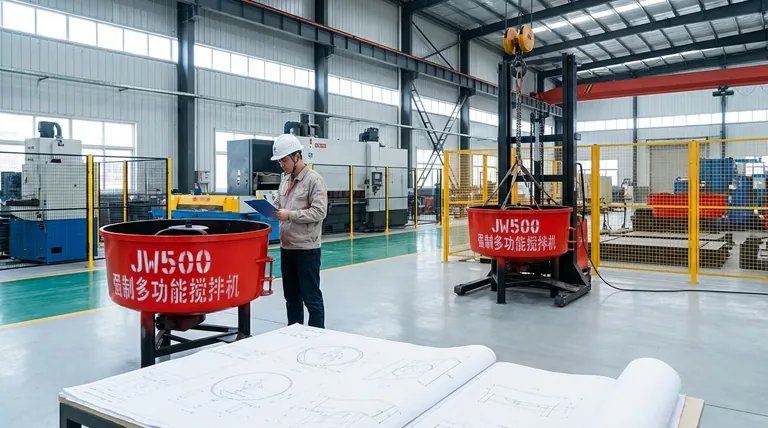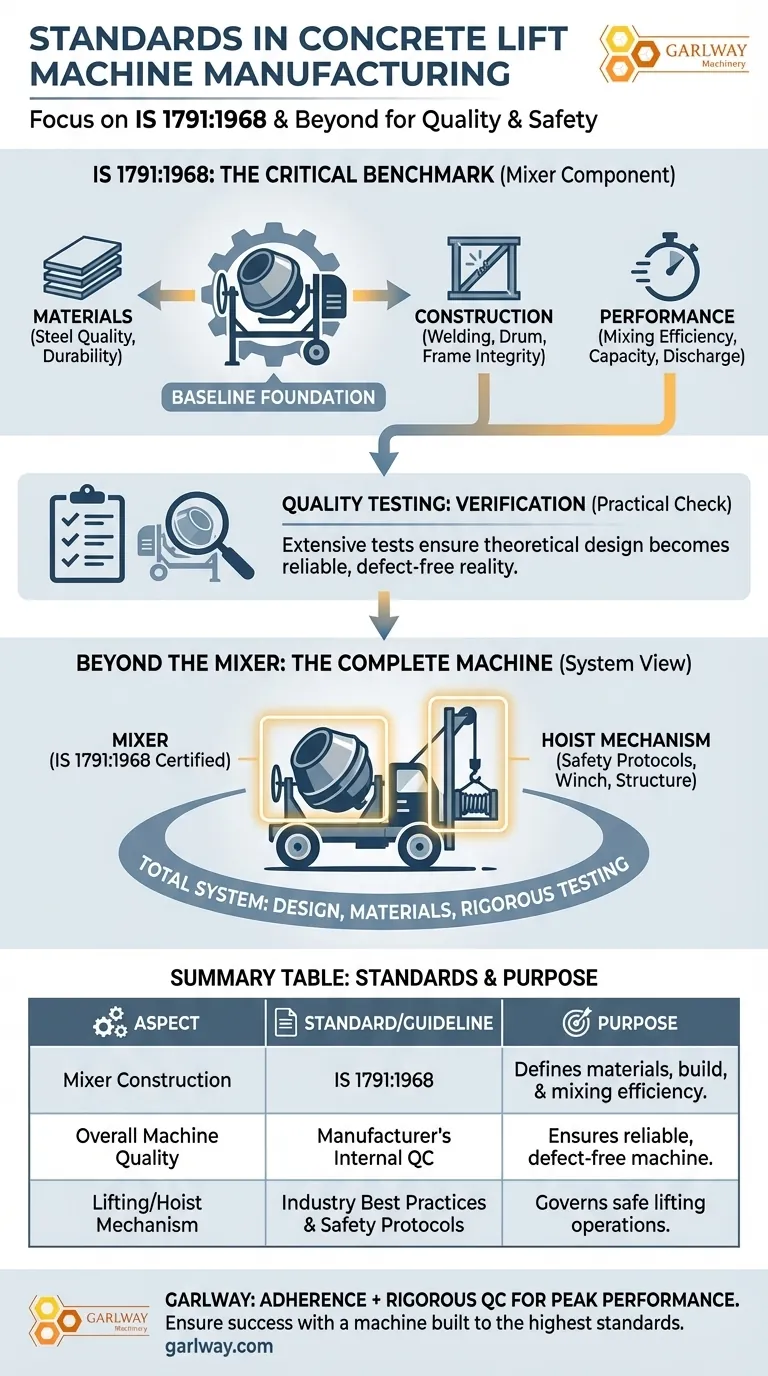In short, concrete lift machines are manufactured in adherence to IS 1791:1968. This specific Indian Standard provides the core framework for the construction and performance of the concrete mixer component, which is a fundamental part of these machines. Adherence to this standard, combined with extensive quality testing, ensures a baseline of reliability and operational integrity.
The central takeaway is that while IS 1791:1968 is the foundational standard for the machine's mixing function, true quality assurance comes from understanding that this standard is part of a larger system of design, material selection, and rigorous testing for the entire machine.

Why IS 1791:1968 is the Critical Benchmark
Understanding this standard is the first step in verifying the quality of a concrete lift machine. It moves the evaluation from a subjective assessment to an objective, data-driven decision.
What This Standard Represents
IS 1791:1968 is the official Indian Standard specification for batch-type concrete mixers. These mixers are a primary component of most concrete lift machines.
This standard establishes clear, non-negotiable requirements for how the mixer must be built and how it should perform.
Core Areas Governed by the Standard
A manufacturing standard like IS 1791:1968 typically dictates specifications for:
- Materials: It defines the quality and grade of steel and other components used, ensuring durability.
- Construction: It outlines requirements for welding, drum thickness, and frame integrity to withstand heavy operational stress.
- Performance: It sets benchmarks for mixing efficiency, capacity rating, and discharge speed, ensuring the machine does its job effectively.
The Role of Quality Testing
The references highlight that these machines undergo "extensive quality tests" before delivery. This is the practical verification of the standard.
Testing ensures that the theoretical design specified in the standard translates into a real-world machine that is reliable and free from manufacturing defects. This step is critical for minimizing the risk of receiving faulty equipment.
Common Pitfalls to Avoid
Relying solely on a single standard can provide an incomplete picture. A truly robust assessment requires a broader view.
The Standard is a Baseline, Not the Ceiling
Adherence to IS 1791:1968 guarantees a solid, reliable machine. It signifies that the manufacturer meets established industry requirements for quality and safety.
However, it is a baseline. Premium manufacturers may exceed these specifications in areas like material thickness, engine quality, or the durability of the lifting mechanism.
A "Lift Machine" is More Than a Mixer
While the mixer is crucial, the "lift" or hoist mechanism is equally important. Buyers should inquire about the design principles, safety features, and testing protocols applied to the wire rope, winch, and structural frame of the lifting system.
A machine that has a certified mixer but a poorly engineered hoist is an unbalanced risk.
Making the Right Choice for Your Goal
Use the manufacturing standard as your starting point to evaluate a machine based on your specific operational needs.
- If your primary focus is compliance and safety: Confirm that the machine adheres to IS 1791:1968 and ask the manufacturer for documentation on quality testing for both the mixer and the hoist.
- If your primary focus is long-term durability: Use the standard as a baseline, then investigate the specific materials used, such as the thickness of the mixing drum and the build quality of the chassis.
- If your primary focus is operational performance: Verify the standard, then closely examine the technical specifications like mixing capacity, lift height, cycle time, and the horsepower of the engine.
Ultimately, a quality concrete lift machine is one where documented standards are backed by transparent and rigorous quality control.
Summary Table:
| Aspect | Standard/Guideline | Purpose |
|---|---|---|
| Mixer Construction & Performance | IS 1791:1968 | Defines materials, build quality, and mixing efficiency for the concrete mixer component. |
| Overall Machine Quality | Manufacturer's Internal QC | Ensures the entire machine (mixer, hoist, frame) is reliable and defect-free through extensive testing. |
| Lifting/Hoist Mechanism | Industry Best Practices & Safety Protocols | Governs the design and safety of the winch, wire rope, and structural frame for safe lifting operations. |
Ensure your project's success with a GARLWAY concrete lift machine built to the highest standards.
As a specialist in construction machinery, GARLWAY manufactures robust winches, concrete mixers, and batching plants. Our concrete lift machines not only adhere to IS 1791:1968 but are subjected to rigorous quality control, ensuring durability, safety, and peak performance for construction companies and contractors worldwide.
Contact GARLWAY today for a machine that meets your specific operational needs and delivers unmatched reliability on the job site.
Visual Guide

Related Products
- Portable Concrete Mixer Machine Equipment for Mixing Concrete
- Hydraulic Concrete Mixer Machine Cement Mixing Equipment for Mixture Concrete
- HZS25 Best Cement Mixer for Quick Mix Concrete at Bunnings
- Concrete Cement Mixer Machine Drum Mixer for Construction
- Construction Products Concrete Plant Machine Mixing Concrete Mixer
People Also Ask
- How much concrete can you mix in a portable mixer? Maximize Efficiency on Small Jobs
- How much concrete can you pour with a portable mixer? Find the Perfect Fit for Your Project
- How much does a batching plant cost? Uncover the True Investment for Your Project
- How long does it take to mix concrete in a portable mixer? Master the 60-Minute Rule
- What is the use of a portable concrete mixer? Maximize On-Site Control & Efficiency


















